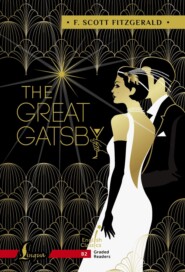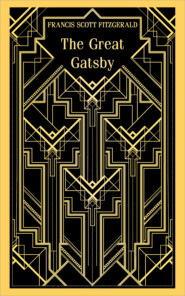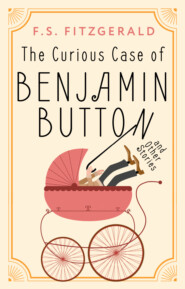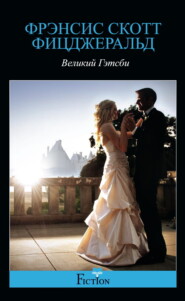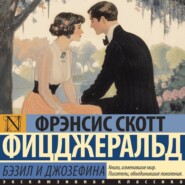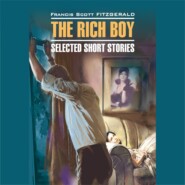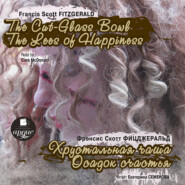По всем вопросам обращайтесь на: info@litportal.ru
(©) 2003-2025.
✖
Великий Гэтсби / The Great Gatsby
Настройки чтения
Размер шрифта
Высота строк
Поля
On Sunday morning while church bells rang in the villages along shore everybody returned to Gatsby's house.
“He's a bootlegger[4 - bootlegger – бутлегер (подпольный торговец спиртным во время сухого закона в США)],” said the young ladies, moving somewhere between his cocktails and his flowers. “One time he killed a man who had found out that he was second cousin to the devil. Give me a rose, honey, and pour me a last drop into that crystal glass.”
Once I wrote down the names of those who came to Gatsby's house that summer. I can still read the names and they will give you a good impression of those who accepted Gatsby's hospitality.
From East Egg came the Chester Beckers and the Leeches, and a man named Bunsen, whom I knew at Yale, and Doctor Webster Civet, who was drowned last summer up in Maine. And the Hornbeams and the Willie Voltaires, and a whole clan named Blackbuck, who always gathered in a corner. And the Ismays and the Chrysties (or rather Hubert Auerbach and Mr. Chrystie's wife), and Edgar Beaver, whose hair turned white one winter afternoon for no good reason at all.
Clarence Endive was from East Egg, as I remember. He came only once and had a fight with a man named Etty in the garden. From farther side of the Island came the Cheadles and the O. R. P. Schraeders, and the Stonewall Jackson Abrams of Georgia, and the Fishguards and the Ripley Snells. Snell was there three days before he went to the jail, he was lying drunk on the gravel drive, and Mrs. Ulysses Swett's automobile ran over his right hand. The Dancies came, too, and S. B. Whitebait, who was well over sixty, and Maurice A. Flink, and the Hammerheads, and Beluga the tobacco importer, and Beluga's daughters.
From West Egg came the Poles and the Mulreadys and Cecil Roebuck and Cecil Schoen and Gulick the state senator and Newton Orchid, who controlled Films Par Excellence, and Eckhaust and Clyde Cohen and Don S. Schwartze (the son) and Arthur McCarty, all connected with the movies. And the Catlips and the Bembergs and G. Earl Muldoon, brother to that Muldoon who afterward strangled his wife. Da Fontano the promoter came there, and Ed Legros and James B. Ferret and the De Jongs and Ernest Lilly-they came to gamble, and when Ferret wandered into the garden it meant he lost.
A man named Klipspringer was there so often and so long that he became known as “the boarder” – I doubt if he had any other home. Of theatrical people there were Gus Waize and Horace O'Donavan and Lester Meyer and George Duckweed and Francis Bull. Also from New York were the Chromes and the Backhyssons and the Dennickers and Russel Betty and the Corrigans and the Kellehers and the Dewars and the Scullys and S. W. Belcher and the Smirkes and the young Quinns, divorced now, and Henry L. Palmetto who killed himself by jumping in front of a subway train in Times Square.
Benny McClenahan arrived always with four girls. Every time they were different, but they were very identical one with another. I have forgotten their names – Jaqueline, I think, or else Consuela or Gloria or Judy or June, and their last names were the melodious names of flowers and months.
In addition to all these I can remember Faustina O'Brien and the Baedeker girls and young Brewer and Mr. Albrucksburger and Miss Haag, his fiancеe, and Ardita Fitz-Peters and Mr. P. Jewett, once head of the American Legion, and Miss Claudia Hip, with her chauffeur, and a prince of something, whose name, if I ever knew it, I have forgotten.
All these people came to Gatsby's house in the summer.
* * *
At nine o'clock, one morning late in July Gatsby's gorgeous automobile lurched up the rocky drive to my door. It was the first time he had called on me though I had gone to two of his parties, mounted in his hydroplane, and, at his urgent invitation, made frequent use of his beach.
“Good morning, old sport. You're having lunch with me today and I thought we'd ride up together.”
He was balancing himself on the dashboard of his automobile. He was never quite still. He saw me looking with admiration at his automobile.
“It's pretty, isn't it, old sport?” He jumped off to give me a better view. “Haven't you ever seen it before?”
I'd seen it. Everybody had seen it. It was a rich cream color, bright with nickel. We sat down behind many layers of glass and started to town.
I had talked with him some times in the past month and found, to my disappointment, that he had little to say. So he had become simply the proprietor of a wonderful restaurant next door.
And then came that silly ride. Gatsby was leaving his elegant sentences unfinished.
“Look here, old sport,” he said surprisingly. “What's your opinion of me, anyhow?”
“Hm, I don't know much…” I began.
“Well, I'm going to tell you something about my life,” he interrupted. “I don't want you to get a wrong idea of me from all these stories you hear. I'll tell you the truth. I am the son of some wealthy people in the Middle-West – all dead now. I was brought up in America but educated at Oxford because all my ancestors have been educated there for many years. It is a family tradition.”
“What part of the Middle-West?” I inquired.
“San Francisco.”
“I see.”
“My family all died and I came into a good deal of money.”
His voice was solemn.
“After that I lived like a young prince in all the capitals of Europe – Paris, Venice, Rome – collecting jewels, chiefly rubies, hunting, painting a little, things for myself only, and trying to forget something very sad that had happened to me long ago. Then came the war, old sport. I was promoted to be a major. Here's a thing I always carry. A souvenir of Oxford days. The man on my left is now the Earl of Doncaster.”
It was a photograph of young men. There was Gatsby, looking a little, not much, younger – with a cricket bat in his hand.
Then it was all true.
“I'm going to make a big request of you today,” he said, “so I thought you ought to know something about me. I didn't want you to think I was just some nobody. You see, I usually find myself among strangers because I drift here and there trying to forget the sad thing that happened to me.” He hesitated.
“You'll hear about it this afternoon.”
“At lunch?”
“No, this afternoon. I know that you're taking Miss Baker to tea.”
“Do you mean you're in love with Miss Baker?”
“No, old sport, I'm not. But Miss Baker has kindly consented to speak to you about this matter.”
I hadn't the faintest idea what “this matter” was, but I was more annoyed than interested. I hadn't asked Jordan to tea in order to discuss Mr. Jay Gatsby.
He did not say another word. His correctness grew on him as we neared the city. We passed Port Roosevelt, and sped along the suburbs. I heard the familiar sound of the motorcycle, and a frantic policeman stood before us.
“All right, old sport,” said Gatsby. We slowed down. Taking a white card from his wallet he waved it before the policeman's eyes.
“All right,” agreed the policeman. “I'll know your automobile next time, Mr. Gatsby. Excuse me!”
“What was that?” I inquired. “The picture of Oxford?”
“I did the commissioner a favor once, and he sends me a Christmas card every year.”
The city seen from the Queensboro Bridge is always the city seen for the first time, it shows its wild mystery and beauty.
“Anything can happen now,” I thought; “anything at all.”
* * *
At noon I met Gatsby for lunch. In the anteroom he was talking to a man.
“Mr. Carraway, this is my friend Mr. Wolfsheim.”
Gatsby took an arm of each of us and moved forward into the restaurant.
“This is a nice restaurant here,” said Mr. Wolfsheim looking at the nymphs on the ceiling. “But I like across the street better!”
“It's too hot over there,” agreed Gatsby.
“Hot and small – yes,” said Mr. Wolfsheim, “but full of memories.”
“He's a bootlegger[4 - bootlegger – бутлегер (подпольный торговец спиртным во время сухого закона в США)],” said the young ladies, moving somewhere between his cocktails and his flowers. “One time he killed a man who had found out that he was second cousin to the devil. Give me a rose, honey, and pour me a last drop into that crystal glass.”
Once I wrote down the names of those who came to Gatsby's house that summer. I can still read the names and they will give you a good impression of those who accepted Gatsby's hospitality.
From East Egg came the Chester Beckers and the Leeches, and a man named Bunsen, whom I knew at Yale, and Doctor Webster Civet, who was drowned last summer up in Maine. And the Hornbeams and the Willie Voltaires, and a whole clan named Blackbuck, who always gathered in a corner. And the Ismays and the Chrysties (or rather Hubert Auerbach and Mr. Chrystie's wife), and Edgar Beaver, whose hair turned white one winter afternoon for no good reason at all.
Clarence Endive was from East Egg, as I remember. He came only once and had a fight with a man named Etty in the garden. From farther side of the Island came the Cheadles and the O. R. P. Schraeders, and the Stonewall Jackson Abrams of Georgia, and the Fishguards and the Ripley Snells. Snell was there three days before he went to the jail, he was lying drunk on the gravel drive, and Mrs. Ulysses Swett's automobile ran over his right hand. The Dancies came, too, and S. B. Whitebait, who was well over sixty, and Maurice A. Flink, and the Hammerheads, and Beluga the tobacco importer, and Beluga's daughters.
From West Egg came the Poles and the Mulreadys and Cecil Roebuck and Cecil Schoen and Gulick the state senator and Newton Orchid, who controlled Films Par Excellence, and Eckhaust and Clyde Cohen and Don S. Schwartze (the son) and Arthur McCarty, all connected with the movies. And the Catlips and the Bembergs and G. Earl Muldoon, brother to that Muldoon who afterward strangled his wife. Da Fontano the promoter came there, and Ed Legros and James B. Ferret and the De Jongs and Ernest Lilly-they came to gamble, and when Ferret wandered into the garden it meant he lost.
A man named Klipspringer was there so often and so long that he became known as “the boarder” – I doubt if he had any other home. Of theatrical people there were Gus Waize and Horace O'Donavan and Lester Meyer and George Duckweed and Francis Bull. Also from New York were the Chromes and the Backhyssons and the Dennickers and Russel Betty and the Corrigans and the Kellehers and the Dewars and the Scullys and S. W. Belcher and the Smirkes and the young Quinns, divorced now, and Henry L. Palmetto who killed himself by jumping in front of a subway train in Times Square.
Benny McClenahan arrived always with four girls. Every time they were different, but they were very identical one with another. I have forgotten their names – Jaqueline, I think, or else Consuela or Gloria or Judy or June, and their last names were the melodious names of flowers and months.
In addition to all these I can remember Faustina O'Brien and the Baedeker girls and young Brewer and Mr. Albrucksburger and Miss Haag, his fiancеe, and Ardita Fitz-Peters and Mr. P. Jewett, once head of the American Legion, and Miss Claudia Hip, with her chauffeur, and a prince of something, whose name, if I ever knew it, I have forgotten.
All these people came to Gatsby's house in the summer.
* * *
At nine o'clock, one morning late in July Gatsby's gorgeous automobile lurched up the rocky drive to my door. It was the first time he had called on me though I had gone to two of his parties, mounted in his hydroplane, and, at his urgent invitation, made frequent use of his beach.
“Good morning, old sport. You're having lunch with me today and I thought we'd ride up together.”
He was balancing himself on the dashboard of his automobile. He was never quite still. He saw me looking with admiration at his automobile.
“It's pretty, isn't it, old sport?” He jumped off to give me a better view. “Haven't you ever seen it before?”
I'd seen it. Everybody had seen it. It was a rich cream color, bright with nickel. We sat down behind many layers of glass and started to town.
I had talked with him some times in the past month and found, to my disappointment, that he had little to say. So he had become simply the proprietor of a wonderful restaurant next door.
And then came that silly ride. Gatsby was leaving his elegant sentences unfinished.
“Look here, old sport,” he said surprisingly. “What's your opinion of me, anyhow?”
“Hm, I don't know much…” I began.
“Well, I'm going to tell you something about my life,” he interrupted. “I don't want you to get a wrong idea of me from all these stories you hear. I'll tell you the truth. I am the son of some wealthy people in the Middle-West – all dead now. I was brought up in America but educated at Oxford because all my ancestors have been educated there for many years. It is a family tradition.”
“What part of the Middle-West?” I inquired.
“San Francisco.”
“I see.”
“My family all died and I came into a good deal of money.”
His voice was solemn.
“After that I lived like a young prince in all the capitals of Europe – Paris, Venice, Rome – collecting jewels, chiefly rubies, hunting, painting a little, things for myself only, and trying to forget something very sad that had happened to me long ago. Then came the war, old sport. I was promoted to be a major. Here's a thing I always carry. A souvenir of Oxford days. The man on my left is now the Earl of Doncaster.”
It was a photograph of young men. There was Gatsby, looking a little, not much, younger – with a cricket bat in his hand.
Then it was all true.
“I'm going to make a big request of you today,” he said, “so I thought you ought to know something about me. I didn't want you to think I was just some nobody. You see, I usually find myself among strangers because I drift here and there trying to forget the sad thing that happened to me.” He hesitated.
“You'll hear about it this afternoon.”
“At lunch?”
“No, this afternoon. I know that you're taking Miss Baker to tea.”
“Do you mean you're in love with Miss Baker?”
“No, old sport, I'm not. But Miss Baker has kindly consented to speak to you about this matter.”
I hadn't the faintest idea what “this matter” was, but I was more annoyed than interested. I hadn't asked Jordan to tea in order to discuss Mr. Jay Gatsby.
He did not say another word. His correctness grew on him as we neared the city. We passed Port Roosevelt, and sped along the suburbs. I heard the familiar sound of the motorcycle, and a frantic policeman stood before us.
“All right, old sport,” said Gatsby. We slowed down. Taking a white card from his wallet he waved it before the policeman's eyes.
“All right,” agreed the policeman. “I'll know your automobile next time, Mr. Gatsby. Excuse me!”
“What was that?” I inquired. “The picture of Oxford?”
“I did the commissioner a favor once, and he sends me a Christmas card every year.”
The city seen from the Queensboro Bridge is always the city seen for the first time, it shows its wild mystery and beauty.
“Anything can happen now,” I thought; “anything at all.”
* * *
At noon I met Gatsby for lunch. In the anteroom he was talking to a man.
“Mr. Carraway, this is my friend Mr. Wolfsheim.”
Gatsby took an arm of each of us and moved forward into the restaurant.
“This is a nice restaurant here,” said Mr. Wolfsheim looking at the nymphs on the ceiling. “But I like across the street better!”
“It's too hot over there,” agreed Gatsby.
“Hot and small – yes,” said Mr. Wolfsheim, “but full of memories.”






